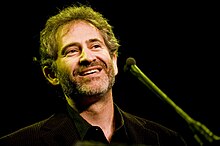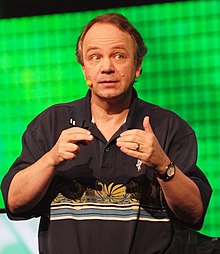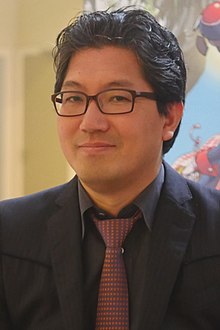Portal:Video games
The Video Games Portal

A video game, sometimes further qualified as a computer game, is an electronic game that involves interaction with a user interface or input device (such as a joystick, controller, keyboard, or motion sensing device) to generate visual feedback from a display device, most commonly shown in a video format on a television set, computer monitor, flat-panel display or touchscreen on handheld devices, or a virtual reality headset. Most modern video games are audiovisual, with audio complement delivered through speakers or headphones, and sometimes also with other types of sensory feedback (e.g., haptic technology that provides tactile sensations). Some video games also allow microphone and webcam inputs for in-game chatting and livestreaming.
Video games are typically categorized according to their hardware platform, which traditionally includes arcade video games, console games, and computer games (which includes LAN games, online games, and browser games). More recently, the video game industry has expanded onto mobile gaming through mobile devices (such as smartphones and tablet computers), virtual and augmented reality systems, and remote cloud gaming. Video games are also classified into a wide range of genres based on their style of gameplay and target audience. (Full article...)
Featured articles –
Nintendo Entertainment Analysis & Development developed the game, led by director Takashi Tezuka and producer and series creator Shigeru Miyamoto. It is the first Mario game for the SNES and was designed to make the most of the console's technical features. The development team had more freedom compared to the series installments for the Nintendo Entertainment System (NES). Yoshi was conceptualised during the development of the NES games but was not used until Super Mario World due to hardware limitations.
Super Mario World is often considered one of the best games in the series and is cited as one of the greatest video games ever made. It sold more than twenty million copies worldwide, making it the best-selling SNES game. It also led to an animated television series of the same name and a 1995 sequel, Yoshi's Island. The game has been re-released on multiple occasions: It was part of the 1994 compilation Super Mario All-Stars + Super Mario World for the SNES and was re-released for the Game Boy Advance as Super Mario World: Super Mario Advance 2 in 2001, on the Virtual Console for the Wii, Wii U, and New Nintendo 3DS consoles, and as part of the Super NES Classic Edition. In 2019, it was released for Nintendo Switch Online as part of the classic games service. (Full article...)
Set in the fictional Star Wars galaxy, the game takes place during the events depicted in the film Star Wars: Episode I – The Phantom Menace. The player controls Gavyn Sykes, a lieutenant in Naboo's Royal Security Forces. As the game progresses, Sykes and the Royal Security Forces fight the Trade Federation in 15 missions that take place on Naboo or in the space surrounding it. The game concludes after the player completes a mission that recreates the film's climactic assault on the Trade Federation's Droid Control Ship.
Battle for Naboo was published by LucasArts and THQ and released for the Nintendo 64 in December 2000. A Windows port was released three months later in March 2001. The Nintendo 64 version was heavily compared to Rogue Squadron and received generally positive reviews; critics praised the game's tight and responsive controls, but expressed dislike for the game's Episode I setting. The game's PC port was less well-received, with critics citing poor visuals and difficult controls. (Full article...)
Did you know... -
- ... that the video game mode Ultimate Team has been criticized for its reliance on loot box packs, considered to be a controversial form of gambling?
- ... that deceased YouTuber Technoblade beat the video game Minecraft in hardcore mode using a racing-wheel controller?
- ... that the case Lewis Galoob Toys, Inc. v. Nintendo of America, Inc. was considered essential to the future of video game modding in the United States in 1992?
- ... that a cheat code in the video game Spyro: Year of the Dragon grants access to a near-complete copy of Crash Bash?
- ... that the 1979 video game Superman was one of the first console games with a pause feature?
- ... that Terra Invicta's development company is a group of former volunteer video game modders that decided to release their own game after the success of their mod?
- ... that before Sarah Elmaleh voiced the player character in the video game Anthem, developed by BioWare, she voiced characters in a mod of an earlier BioWare game?
- ... that a video game consisting solely of a clickable image of a banana was briefly the second-most played game on Steam?
- ... that the video game Manor Lords was wishlisted more than three million times on Steam after its developer had estimated it would receive around 14,000?
- ... that Goodboy Galaxy was the first commercially released video game for the Game Boy Advance in more than 13 years?
- ... that the game designer of the video game Hades said that the characters were attractive "because Jen Zee"?
- ... that players of the simulation video game Overcrowd: A Commute 'Em Up need to manage everything from the construction of train stations to dumping trash cans?
Selected biography –
Selected image -
Recent video game-related events
- January 16, 2025 –
- Nintendo officially reveals the Nintendo Switch 2 video game console, the successor to the Nintendo Switch. (Nintendo)
- September 12, 2024 – 2023–2024 video game industry layoffs
- Microsoft announces that it will lay off 650 Microsoft Gaming employees as part of cuts to its workforce. (Variety)
- August 15, 2024 –
- American video game magazine Game Informer discontinues publication after 33 years. The magazine's website is also shut down. (BBC News)
Topics
Categories
Things you can do
In other Wikimedia projects
The following Wikimedia Foundation sister projects provide more on this subject:
-
Commons
Free media repository -
Wikibooks
Free textbooks and manuals -
Wikidata
Free knowledge base -
Wikinews
Free-content news -
Wikiquote
Collection of quotations -
Wikisource
Free-content library -
Wikiversity
Free learning tools -
Wiktionary
Dictionary and thesaurus
















































